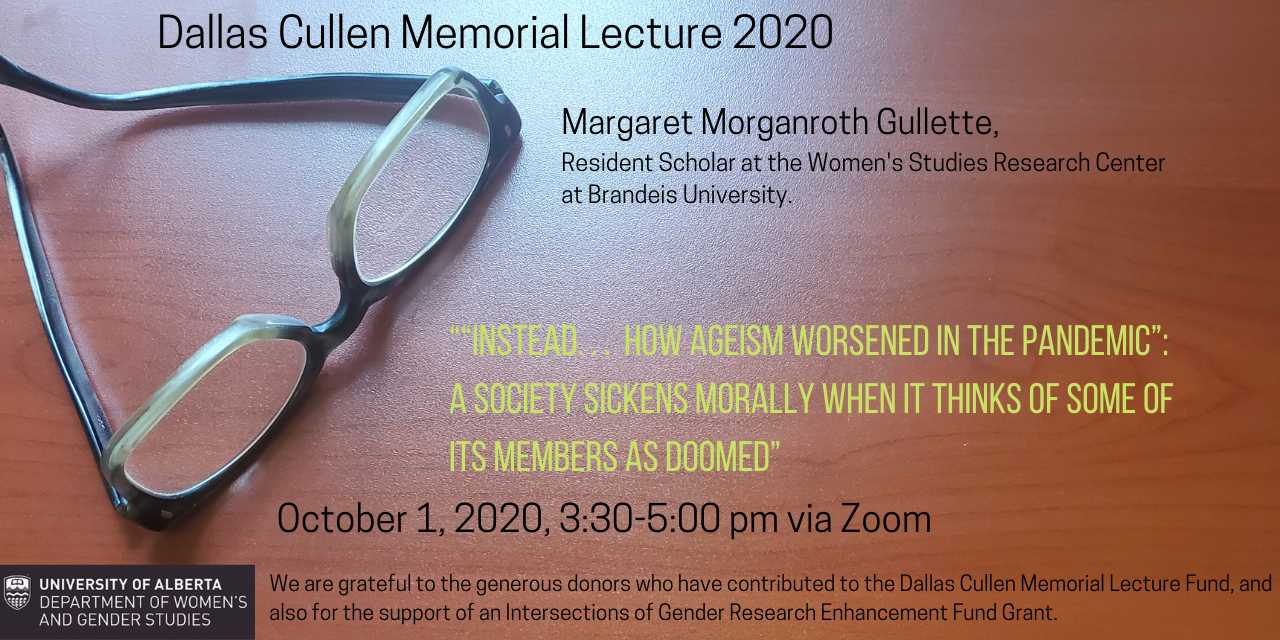Ageism and the Pandemic
Donna McKinnon - 29 September 2020

The toll of COVID-19 on older generations has illuminated the stark consequences of ageism, but age-based mistreatment and discrimination is not new, says Margaret Morganroth Gullette, an internationally known cultural critic in age studies. The pandemic, she says, has only made it worse.
Gullette will be speaking at the Department of Women's and Gender Studies’ annual Dallas Cullen Memorial Lecture on October 1. Cullen, a pioneer in the study of women's leadership as well as gender and organizations, was the longest serving chair of the burgeoning and interdisciplinary Women's Studies Program, which was established in 1987. Earning full department status in 2013, Women's and Gender Studies honours Cullen, who passed away in 2010, with the annual memorial lecture —- the signature event of the academic year.
“In five short months of 2020, experts mostly agree, responses to COVID-19 sharply worsened already-existing ageism,” says Gullette, a Resident Scholar at the Women's Studies Research Center at Brandeis University.
Gullette’s lecture, "Instead...How Ageism Worsened in the Pandemic: A society sickens morally when it thinks of some of its members as doomed", will draw on decades of research and grim new realities.
“Hopelessness about the victims of bias lessens the human will to rescue them,” explains Gullette. “Ageism demoralizes the targets of bias themselves. This particular stereotype —- "doomed to die" —- threatens younger people too, making them careless of their immortal lives. And all of this makes national grieving for the loss of our elders, my peers, harder.”
Gullette emerged as the primary theorist and practitioner of what she coined 'age studies’, in the 1990s. She was also the first theorist to demand that intersectionality include ageism, says Lise Gotell, a Landrex Distinguished Professor in the Department of Women’s and Gender Studies.
“Ageism is a prejudice which intimately subsumes all the social biases (since a diverse group ages into later life), including sexism, racism, classism, "dementism", and ableism,” explains Gullette.
Anne Thomas calls Gullette her a ‘scholarly crush”. While working through her MA in Gender and Social Justice, Thomas looked to Gullette’s books for guidance and insight, particularly as it related to her own encounters with ageism as a mature student. “She earned my trust as I explored feminist gerontology,” says Thomas, who will introduce Gullette at the lecture.
“I found a reliability of thought, a steadfastness of conviction and a legibility in theory.”
Described as one of gerontology's few public intellectuals, Gullette’s books and essays have garnered many awards and citations. Her most recent book, Ending Ageism, or How Not to Shoot Old People, won both the Modern Language Association Prize for Independent Scholars and the American Psychological Association's Florence L. Denmark Award for Contributions to Women and Aging.
The Department of Women's and Gender Studies’ annual public lecture, the 2020 Dallas Cullen Memorial Lecture: "Instead...How Ageism Worsened in the Pandemic: A society sickens morally when it thinks of some of its members as doomed", with Margaret Morganroth Gullette, will take place Thursday, October 1 from 3:30 - 5:00 p.m. MST via Zoom. Please register here.